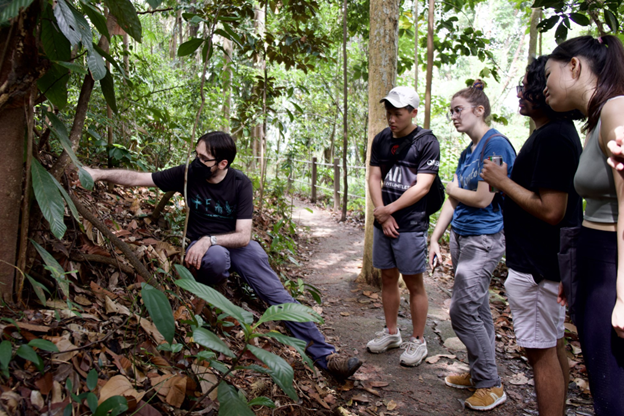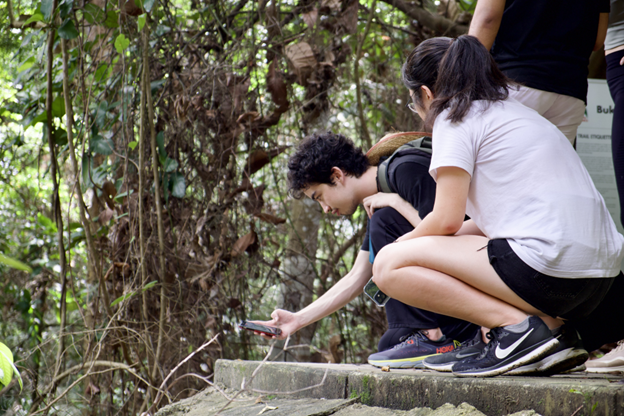Yale-NUS students explore the social world of insects
Students learn about the ecology and evolution of social insects
A Yale-NUS College course in the life sciences, Social Insect Societies, introduces students to the micro-world that is socially organised by insects such as ants or bees. The class, taught by Lecturer of Science (Life Sciences) Sebastian Pohl, poses challenging questions: What makes ant and bee colonies so numerous and widespread, and what can we humans learn from them about our own societies? Firmly interdisciplinary and grounded in experiential learning, the class explores the origins of sociality, cooperation and collective decision-making among insects, and features outdoor experiments and a semesterly trip to the local Bukit Timah Nature Reserve.
The focus on hands-on learning outside of the classroom proved fruitful for the students, who were exposed to the often-unnoticed world of insects just beneath their feet. Ruth Lim (Class of 2024), a student who took the course in the last academic year, reflected, “Social Insect Societies brought me into the fascinating world of insects, where I learnt how these creatures employ elegant yet complex individual and group strategies to thrive even in the harshest conditions. The field trip to Bukit Timah Nature Reserve opened my eyes to the vast amount of biodiversity in Singapore, as it was my first time paying attention to the various species of insects all around me.” Aaditya Patwari (Class of 2024) echoed, “The field trip to Bukit Timah Nature Reserve was especially memorable, as we could observe the concepts we learned in class —such as foraging, tandem running, and cooperative transport— coming to life right in front of us!” Aaditya also emphasised that the course went beyond the traditional scope of the life sciences discipline, as it “ventured into interdisciplinary topics like group cooperation, communication, and human-animal relations.” This highlights the multifaceted nature of a liberal arts education offered at the College.
 Dr Sebastian Pohl points insects out to a group of students. Image provided by Glenda Wee.
Dr Sebastian Pohl points insects out to a group of students. Image provided by Glenda Wee.
Glenda Wee (Class of 2025) shared that one of the class assignments allowed her to connect deeply with the natural world: “The most memorable project I worked on in Social Insect Societies was the Daily Life Problem, in which my group mates and I had to put ourselves in the (tiny) shoes of an ant colony to solve just one of the problems they might face in a day of their lives. Not only did I gain more knowledge on different ant species and their adaptations, but I also developed empathy and wonder for these small creatures.”
The course introduces the students to scientific knowledge about insect evolution and interactions as well. This enables them to integrate this knowledge into their work for other courses or their personal research projects. Stanley Tan (Class of 2024) reflected on his experience in the class so far: “Learning about the different interactions between insects of both the same and different species, from the individual to the colony scale, has been extremely fascinating. One of the great things about this class is that it gets us to actively think about how some of these interactions developed over time and what ecological functions these interactions have. With the knowledge gained from this class, I look forward to enriching my research on plant communities by exploring how interactions between insects can affect plants and forests.”
 Students document their discovery of social insects. Image provided by Glenda Wee.
Students document their discovery of social insects. Image provided by Glenda Wee.
Erica Lee (Class of 2024), shared how the class expanded her technical knowledge of social insects: “So far, the main things I’ve learnt from the class, besides what eusocial insects are and their characteristics, are why did they evolve to begin with, unique aspects and strategies of different species (e.g. the parasitism of slavemaker ants), and specific ways how these as a colony accomplish various tasks.” Erica also shared that she is most excited about the upcoming trip to the Bukit Timah Nature Reserve in the second half of the semester, which will help students apply the knowledge obtained in the classroom through observational fieldwork.
Dr Pohl hopes that the students in his course will gain an appreciation and understanding of social insects and their fascinating life histories: “Social insect societies face similar challenges to human societies, but the way they solve these problems is quite different. I hope that this course allows the students to learn about the intriguing adaptations of social insects to their environment. There are natural wonders and opportunities for scientific experiments to be found even in the middle of Singapore, and we can just go out and explore the amazing world of social insects around us!”





